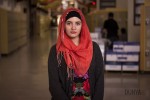At the beginning of September, I attended the annual Islamic Society of North America (ISNA) convention in Washington, D.C. The event brings many well-known speakers, a bazaar, art exhibits, the always popular “speed marriage interviews a.k.a. the matrimonials,” and various entertainment acts from across the ISNA, Muslim Students Association (MSA), and Muslim Youth of North America (MYNA) organizations. The convention brings several thousand attendees.
Going into the weekend-long conference, I wasn’t sure what to expect. While I’ve attended the conference once before several years ago in Chicago, I have only vague memories of visiting the massive bazaar (and little else). This year’s convention proved to be a thoroughly insightful and inspiring time.
The most memorable and thought-provoking session for me took place the first evening of the conference. (Here’s a link to the convention program that gives brief descriptions of all of the sessions). Professors Seyyed Hossein Nasr and John Esposito, along with Feisal Abdul Rauf, and Zaid Shakir spoke eloquently during the session, “Interweaving Religion & Life in a Moral Society.” Professor Nasr commented throughout his presentation on the interrelationship between humans and nature—an environmental theme that I found refreshingly popped up throughout many of the convention sessions I attended (another favorite session of mine was one on “Caring for the Earth: Conserving its Resources for Future Generations and All Creation,” where the environmental theme was the entire focus).
Professor Nasr highlighted the “[overemphasis of the] human state over the rights of others” and our collective egotism as something to be aware of when considering the society we live in. He reminded us of to be mindful and “consider the sanctity of our creatures” (both human and non-human alike) as they all arise from the same source “al-Quddus”: “We cannot destroy other things without destroying ourselves.” He also reminded us that the “multiplicity of religion is the will of God” and that it is thus imperative for us to be respectful of other faiths: “[There is a] special duty on our shoulders for amity and respect as we are the last religion.” I hope ISNA posts a video of this session online, as I fear I’ve failed to do justice to Professor Nasr’s talk here.
While many of the sessions were moving, and brought speakers—both Muslim and non-Muslim—from a variety of diverse backgrounds, I was disappointed to see that women speakers were not present at any of the large evening sessions. The lack of women presenters is something MMW has addressed in past North American conferences, including the 2008 Reviving the Islamic Spirit (RIS) conference, 2009 RIS conference, the 2009 joint ISNA-RIS conference, and the 2011 RIS conference. In January of this year we published a handy list of possible women speakers for conferences to consider.
One of the most glaring examples of the lack of women speakers was apparent at the Saturday evening session, “One Nation Under God: Striving for the Common Good,” I had been looking forward to hearing from Karen Armstrong (who was at the conference to promote the Charter for Compassion), only toward the end of the session to realize that she wouldn’t speak that evening. Instead, we heard from Hamza Yusuf about our society’s consumerism and disregard for the environment, a fundraising attempt, and a speech from an Arabic speaker (the speaker’s name escapes me!) that received only a partial English translation.
Armstrong’s absence from the session was baffling, as we saw her seated in the audience several times thanks to a roving audience camera; she was listed in the program as the session’s “special guest,” and yet didn’t appear on stage. The large Sunday evening MSA session also didn’t include any women speakers among their lineup of Suhaib Webb, Siraj Wahhaj, Altaf Husain, Hamza Yusuf, and Tariq Ramadan.
The day sessions seemed to have had more women speakers in attendance, at least according to the program. There were so many different, interesting sessions that took place at the same time that it was hard to decide which ones to attend. One of the packed day sessions I attended, “Combatting Islamophobia in Media,” had a number of Muslim women speakers who spoke about the various ways they worked in American media.
At this session, moderated by Tayyibah Taylor, Wardah Khalid spoke of her work engaging with others through her blog Young American Muslim and social media. She gave a wonderful personal example of how through her blog at the Houston Chronicle, she is able to reach a number of readers who may first learn about Islam online.
Waliya Lari, a television news producer, gave real-world advice on how Muslim communities can engage with local news networks to ensure an improvement in coverage. Her advice ranged from meeting with journalists (being sure to bring samosas and bakhlava!), to having a press contact person in organizations, submitting photographs (from Eid celebrations, for example) for local news photo slideshows, and perhaps most importantly, to encourage Muslims who are interested to pursue journalism.
Having no expectations for the weekend-long convention, I was pleasantly surprised by what it had to offer. There were numerous interesting sessions to select to attend, the speakers came from a variety of different life experiences and included those who weren’t Muslim, the sessions I went to were well-attended (I was even, surprisingly, turned away from one of the MSA sessions that had reached capacity), and attendees seemed to be relatively engaged, given the number of questions posed during question+answer sessions, when these took place.
That being said, the absence of women speakers from the larger evening sessions is deplorable and something ISNA should seek to address and correct at future conventions. Tariq Ramadan himself mentioned in the large MSA evening session how Muslim women take a more active role than men in organizations across the country these days and must strive to work together alongside each other. Hopefully, future convention organizers will heed this idea, tackle the systemic absence of women head-on, and bring more respected women speakers to present at the large evening sessions to better reflect the important roles Muslim women have in their religious organizations and society.



